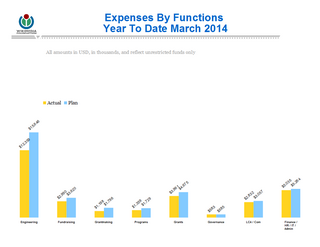| For versions in other languages, please check the wiki version of this report, or add your own translation there! |
Highlights from the Wikimedia Foundation Report and the Wikimedia engineering report for April 2014, with a selection of other important events from the Wikimedia movement
Contents
Wikimedia Foundation highlights
Wikimedia Labs migrated to the new data center
The Wikimedia Labs platform enables volunteers to host software tools to support the community’s work, and to get involved in the technical operations of Wikimedia servers. As part of the Foundation’s ongoing work to reduce reliance on the old data center in Tampa, Florida (USA), Labs was moved to the new data center in Ashburn, Virginia in April, completing several months of work by WMF staff and by volunteers who operate Labs projects. Among the advantages is the switch to a new file system (NFS) which is much more reliable that the one used used for Labs in the old data center (GlusterFS, which had caused most of the Labs failures and downtime in the preceding months). Also, in the new data center, many Labs projects are now using the internal Labs web proxy, which provides several benefits including HTTPS access and increased user data privacy. The Toolserver, the predecessor of the “Tool Labs” part of Wikimedia Labs, is planned to shut down on June 30.
New MediaViewer starts getting released on Wikimedia sites
The Foundation’s multimedia team released Media Viewer v0.2 on 14 pilot sites in April, in preparation for a wider deployment in May. The overall response was favorable, and a growing majority of survey respondents was finding this new multimedia browser useful. The team also developed a set of metrics dashboards to track how often MediaViewer and its various features are used, and how fast it performs over the Internet, as well as local metrics dashboards for selected sites: first results showed a decline in image load time, and suggest that Media Viewer loads faster than the old file description pages.
New Executive Director and Chief Communications Officer
In April, preparations took place to welcome the Foundation’s incoming executive director Lila Tretikov, who was announced on May 1. She will succeed Sue Gardner on June 1, who will move into a new role as special adviser. Lila Tretikov was born in the Soviet Union and moved to the United States as a teenager. She has been working for technology companies, primarily in open source, in the San Francisco Bay Area for the past 15 years, most recently at SugarCRM.
Also in April, Katherine Maher was announced as the Foundation’s new Chief Communications Officer.
Data and Trends
Global unique visitors for March:
- 495 million (+4.44% compared with February; -4.33% compared with the previous year)
- (comScore data for all Wikimedia Foundation projects; comScore will release April data later in May)
Page requests for April:
- 20.697 billion (-1.6% compared with March; -0.6% compared with the previous year)
- (Server log data, all Wikimedia Foundation content projects including mobile access, but excluding Wikidata and the Wikipedia main portal page.)
Active Registered Editors for March 2014 (>= 5 mainspace edits/month, excluding bots):
- 79,352 (+4.59% compared with February / -2.84% compared with the previous year)
- (Database data, all Wikimedia Foundation projects.)
Report Card (integrating various statistical data and trends about WMF projects):
Financials
|
|
|
(Financial information is only available through March 2014 at the time of this report.)
All financial information presented is for the Month-To-Date and Year-To-Date March 31, 2014.
| Revenue | 40,957,259 |
|---|---|
| Expenses: | |
| Engineering Group | 12,358,813 |
| Fundraising Group | 2,989,855 |
| Grantmaking Group | 1,198,163 |
| Programs Group | 1,358,725 |
| Grants | 3,961,161 |
| Governance Group | 582,854 |
| Legal/Community Advocacy/Communications Group | 2,831,941 |
| Finance/HR/Admin Group | 5,034,754 |
| Total Expenses | 30,316,266 |
| Total surplus | (10,640,993) |
| in US dollars |
- Revenue for the month of March is $1.71MM versus plan of $0.01MM, approximately $1.70MM or 29,215% over plan.
- Year-to-date revenue is $40.96MM versus plan of $45.05MM, approximately $4.09MM or 9% under plan.
- Expenses for the month of March is $3.22MM versus plan of $4.57MM, approximately $1.35MM or 30% under plan, primarily due to lower personnel expenses, internet hosting, FDC grants, payment processing fees, and travel expenses partially offset by higher legal fees and outside contract services.
- Year-to-date expenses is $30.32MM versus plan of $36.37MM, approximately $6.05MM or 17% under plan, primarily due to lower personnel expenses, capital expenses, internet hosting, legal fees, payment processing fees, staff development expenses, grants and travel expenses partially offset by higher outside contract services.
- Cash and Investments – $50.69MM as of March 31, 2014.
Other highlights from the Wikimedia movement
Annual Wikimedia Conference joins Wikimedia organizations in Berlin
From April 10-13, representatives of Wikimedia chapters, the Wikimedia Foundation and other organizations and committees from the Wikimedia movement attended Wikimedia Conference 2014 in Berlin, hosted by the German chapter. In previous years, many presentations covered program activities by chapters, but this year’s conference focused more on organisational issues and the future of the Wikimedia movement in general. Examples from the schedule:
- Wikimedia Germany presented the results of its Chapters Dialogue project, which assessed the needs, goals and stories of Wikimedia chapters. Representatives from all chapters had been interviewed for the project, alongside other actors.
- Several other sessions and workshops at the conference discussed how to evaluate
the success of program activities in the movement.
Wikimedians remember Adrianne Wadewitz and Cynthia Ashley-Nelson
The Wikimedia movement mourned the unexpected deaths of two prominent female Wikipedians in April.
Adrianne Wadewitz (User:Wadewitz) began editing Wikipedia in 2004, reaching over 50,000 edits. She was known as a scholar who advocated the use of Wikipedia in education and helped to pioneer the approach of letting students contribute to Wikipedia as part of their courses (today the Wikipedia Education Program). Her work to overcome Wikipedia’s gender gap earned her wide recognition.
Cynthia Ashley-Nelson (User:Cindamuse) began editing Wikipedia in 2007, reaching over 33,000 edits. She participated in the Volunteer Response Team (OTRS) and was a moderator of the gender-gap mailing list. She passed away at the Wikimedia Conference in Berlin where she had just been elected vice-chair of the Affiliations Committee.
Wiki Education Foundation receives $1.39 million grant
The Wiki Education Foundation was initiated in 2013 as a spin-off of the Wikimedia Foundation, assuming responsibility for supporting the Wikipedia Education Program in the United States and Canada, formerly run by the Wikimedia Foundation. The program, in which students write Wikipedia articles in place of traditional term papers, created the equivalent of more than 7,000 printed pages of new, high-quality content during the fall term of 2013 and the equivalent of more than 36,000 printed pages of content since its start in 2010.
On April 14, the Wiki Education Foundation announced that it had received a $1.39 million grant from the Stanton Foundation. The grant covers the first year of a three-year funding period, and supports improvements in the education program in the US and Canada, as well as additional programs to improve underdeveloped content areas on Wikipedia.

Can you help us translate this article?
In order for this article to reach as many people as possible we would like your help. Can you translate this article to get the message out?
Start translation







